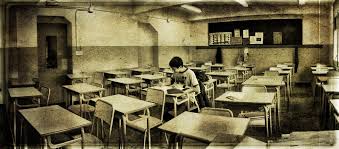
With no external standards, it is impossible to compare the marks of students in different schools, and universities are flying blind when it comes to admissions. The result is that many woefully-unprepared students gain university admittance only to flunk out by Christmas or to see their first-year marks drop by more than 10 per cent. Not only is this hard on the students financially, it also crushes their spirits.
Now, before I go further, I must confess that Departmental Exams were abolished in Ontario when I was in Grade 11 . Two years later when I was accepted at the University of Toronto, there was no "objective" measure of my level of achievement, they simply had to believe my school. Two undergraduate, and two post-graduate degrees later I thought that I was safe, until I was "outed" in the Globe as a charter member of that slacker cohort who skated on into university without my appropriate baptism by fire.
We have come a long way in educating students in the more than four decades that have passed since I graduated from high school. Today's learners exhibit higher level thinking and problem-solving skills than my peers ever did, they are masters at sifting through a variety of data and viewpoints (not just memorizing the approved textbook), and they are risk takers and innovative thinkers. Our assessment techniques are varied and reflect the strengths and skills of our students. Exams are still a part of the mix, but just a part.
Is there some grade inflation without the great leveller of standardized exams? Of course there is. Does it matter? Not really. Grades have become a debased currency. Everyone knows it. So what about the vast majority of post-secondary institutions? How can they protect themselves against the hordes of "unprepared" students who are pounding at their gates? To begin with, let's remember that it is not the job of high schools to do admissions screening for post-secondary institutions. They have a much broader and more meaningful mandate. It is up to the universities and colleges to identify students who are a good fit with their programmes and services. Complaining that the current high school grading system isn't working for them, is a cop-out and one that sometimes masks the fact that universities over-enrol with an expectation that a certain percentage of students will fail and drop out. The institutions complain, but it is the students who suffer. There are better ways to try to predict student success. That is why innovative institutions ask for portfolios, conduct student interviews, check references and move beyond numbers in their admissions processes. It takes time, and effort, and it is more than worth it, but so far these schools are the exceptions, not the rule.
Let's face it. We all know what exams really are. They are not particularly accurate ways to demonstrate knowledge or skills, they are hurdles to be jumped. In the second decade of the 21st century, we know that standardized exams are just a simple screening device. Those who are good at them, get through; and, those who have a different learning style or skill set, don't.
So this week, the province turned a big corner. Student anxiety will go down and teacher creativity will ramp up as they scramble to develop new strategies to keep students engaged without the looming stick of the "provincials" over their heads. My only lament in this whole process, is the timing of the Ministry announcement. Today there are thousands of students across the province waking up to the knowledge that they will be the last cohort to have to face provincial exams. Not the most helpful news when you are trying to gear yourself up to write.
Couldn't they just have waited until July to let us know?



 RSS Feed
RSS Feed
